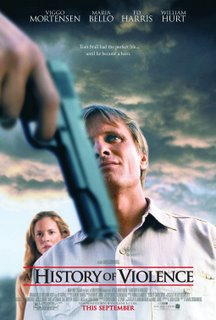Movie Review: A History of Violence

UNIVERSAL REMOTE
David Cronenberg depicts violence as a virus. Once it is unleashed, it consumes an entire family. First it is unleashed by the father. Then it infects the son. The mother tries to reject it and begins throwing up in the bathroom. The father says he thought he was cured years ago in the desert. But there is no cure.A History of Violence is a very good movie, one that shows violence in a very different way than most films. The violence here happens very quickly and is often gruesome. Cronenberg is well-known for his pre-occupation with "the flesh" and that theme continues here. When someone gets their face blown off, it is really blown off. He forces you to look at it and confront your own feelings about violence and screen violence. There is a crucial difference.
I've never personally been in a truly violent situation but I've observed plenty of fights and know that most people's reaction to conflict is to freeze. Very few people are comfortable in these situations. That is how the people in A History of Violence behave, even some of the "bad guys." In most movies, people are quick to join in the fight and know exactly what to do, exactly how to throw a perfect punch. Screen violence is more about choreography than realism. It is more about fulfilling the fantasies of the audience.
Violence is not a perfect movie, in fact, some of the action at the end seems over-the-top. It would fit perfectly in a Lethal Weapon movie, but not here. (Cronenberg falls into his own trap.) The performances are uniformly excellent. Viggo Mortenson is fine in a role that Harrison Ford could have played 20 years ago. Maria Bello gives another strong performance. And William Hurt is very funny as an unlikely gangster. But for me Ed Harris steals the movie. His performance as the outsider with the scarred face and glass eye who comes to town to settle old scores is chilling. He has been a consistently great actor now for over 25 years.
In addition to violence, the movie also has two very powerful loves scenes. The first is surprisingly kinky and goes on a lot longer than you expect. The second is very raw and has provoked various responses from people I know that have seen the movie. One person called it rape, while most others saw it as rough sex. I agree wholeheartedly with the latter. There is a moment where, as if intoxicated by the violence around them, the couple stop hitting each other and begin to f*ck. (There is no other word to describe it.) At the end, they act like strangers to each other, emptiness filling both of them. It is one of the most intense sex scenes I've ever seen.
The biggest disappointment I had seeing A History of Violence was not the movie but the audience I saw it with. I was watching a movie that was condemning violence while most of the audience was watching a movie that was condoning it. When people were hurt, they literally cheered. It's a depressing thought, but I think it is impossible to make a film that depicts violence without celebrating it. Audiences are too conditioned to react with pleasure. They simply can't be trusted.
I appreciate the maturity of Cronenberg's direction. He stages violence then forces us to look at the aftermath. He depicts two very difference love scenes and makes us compare and contrast the different emotions that can send people to bed together. Few filmmakers are willing to show these things because they are uncomfortable. But they are honest and that is why they are so memorable.

0 Comments:
Post a Comment
<< Home